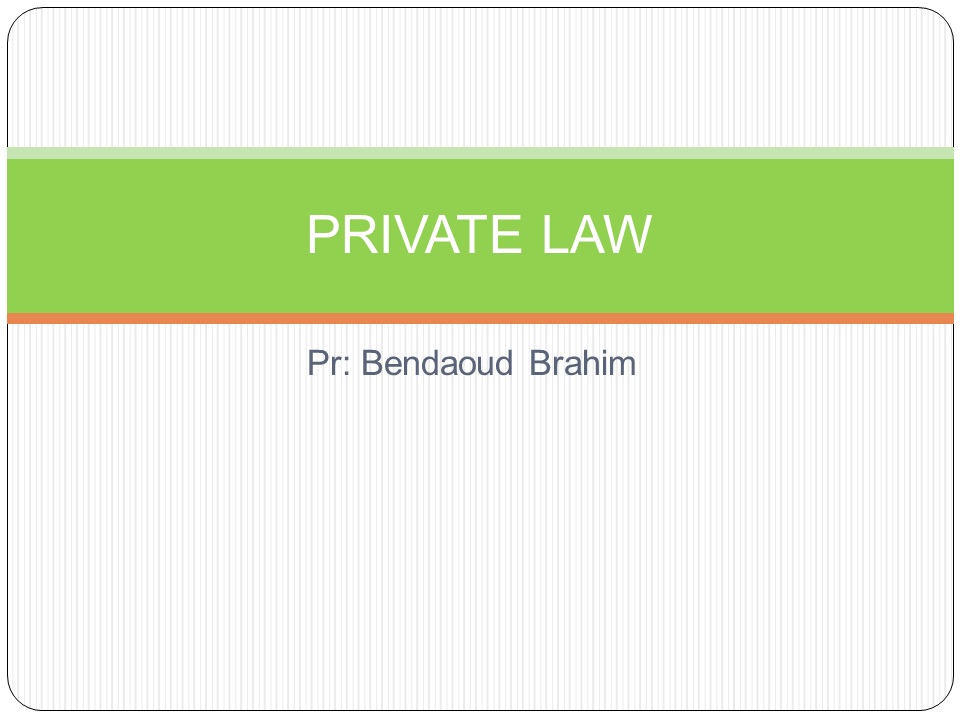PRIVATE LAW
Private law is a part of law that defines, regulates, enforces and administrates relationships among individuals, associations and corporations.
Private law is a part of law that defines, regulates, enforces and administrates relationships among individuals, associations and corporations.
Contracts – agreements between two entities, creating an enforceable obligation to do or to refrain from doing a particular thing.
Freedom of contract - freedom to form contracts without government restrictions, that allows individuals to choose with whom to contract, wheter to contract or not, and on which terms to contract. The contracting parties may arrange their legal relationship at their discretion, as long as its contents or objective are not contrary to the the law, or the principles of life in community.
ESSENTIAL ELEMENTS OF A CONTRACT
Offer
Acceptance
Consideration
Intention to create legal relations
TYPES OF CONTRACTS
Consulting agreement/Consultancy agreement
Contract of assignment
Contract of service
Contract of suretyship
Contract to complete specific work/contract to perform specific task
Cooperation agreement
Distribution agreement
Donation
Employment contract
Partnership
Pledge agreement
Publishing contract
Sale
Settlement
Sponsorship agreement
Storage contract
Supply
Suretyship
Tenancy
By the contract of sale the seller undertakes to transfer the ownership of a thing to the buyer and to release the thing to him and the buyer undertakes to collect the thing and to pay the price to the seller.
A sale by instalments is a sale of a movable thing to a natural person, carried out within the scope of business's activity at a price payable in specified instalments, if according to the contract the thing is to be released to the buyer prior to the full payment of the price.
By the contract of exchange each party undertakes to transfer to the other party the ownership of a thing in exchange for an obligation to transfer the ownership of the other thing.
By the contract of supply the delivering party undertakes to produce things specified as to their kind only and to deliver them in parts or periodically and the receiving party undertakes to collect the things and to pay the price
By the contract of loan the lender undertakes to transfer to the borrower the ownership of a specified amount of money or of things specified as to their kind only, and the borrower undertakes to return the same amount of money or the same amount of things of the same kind and of the same quality.
By the contract of lending for use the lender for use undertakes to allow the borrower for use to gratuitously use the thing given to the latter for this purpose for a definite or an indefinite period of time.
By the contract of donation the donating party undertakes to render gratuitous performance for the benefiting party at the expense of his own property.
A mandate contract is one in which an individual gives another person the power to carry out designated actions on the individual's behalf in legal dealings. The person authorizing another to act on the his behalf is known as the mandator, while the person receiving authorization to act on behalf of the other is known as the mandatory.
By a contract for specific task the party accepting the order undertakes to complete a specified task and the party ordering the task undertakes to pay him remuneration.
What type of contract is it?
- A contract regarding the provision of services in the form of know-how transfer form party who is a specialist in the field to a party who needs advice and assistance in this area.
- A contract regarding the legal relationship between a party lending finiancial support to another party in exchange for displaying e.g. the trademarks or logos of the financing party.
- A contract by which one party allows the other party to have access to a business’s proprietary knowledge, processes and trademarks in order to allow the party to sell a product or provide service under the business’s name. In exchange for the right to run a business under the name of the first party, the second party is obliged to pay initial start-up and annual licensing fees.
Answers
consultancy agreement
2 sponsorship agreement
3 franchise agreement
Debtor/creditor
Obligor/obligee
Principal/agent
Lender/borrower
Landlord/tenant
Lessor/lessee
Seller/buyer
Donor/donee
Mandate/mandatory

- Créateur de cours: BENDAOUD BRAHIM
